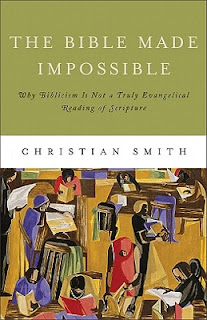Christian Smith, a preeminent sociologist, thinks that most Evangelicals misread the Bible. In The Bible Made Impossible: Why Biblicism Is Not a Truly Evangelical Reading of Scripture (Brazos Press, 240 pages, hardcover), Smith aims his attack specifically on “biblicism”. That’s his term for any Christian paradigm which places the Bible as the ultimate religious authority–a nuanced version of “sola Scriptura“, the famous Reformation rallying cry.
According to Smith, the primary effect of biblicism is what he calls “pervasive interpretive pluralism”, a fancy way of saying that the Evangelical world is overwhelmed by conflicting interpretations of Scripture. The Bible, purported to be “perspicuous” (easy to understand), is instead interpreted in vastly different ways by many different groups, each claiming to hold the “Biblical view” or espousing “what the Bible really says.”
For example, all Christians claim to believe Jesus’ words at the end of John 6. Yet one group holds that Jesus is defining the Real Presence of the Eucharist, another says that Jesus is alluding to spiritual communion, and a third group claims that Jesus was merely using metaphor and was in no way referring to a sacrament. So how can sincere, Bible-loving Evangelicals determine which view is correct? Who decides and by what objective criteria?
That’s the problem Smith surveys in the first part of his book and it’s there he’s at his best. He pokes holes in the biblicist system and shows how it ultimately breaks down.
Smith uses the book’s second part to propose a few solutions. In my mind, none of these fixes really solve biblicism’s fundamental problem: the lack of an objective, interpretative authority beyond the Bible. Smith admits as much noting that his solutions are merely personal suggestions, but that his early dismantling of biblicism doesn’t depend on them.
It’s interesting to note that Smith began writing the book as a committed Evangelical, but by its finish converted to Catholicism. He never suggests Catholicism as the only solution to “biblicism” or “pervasive interpretive pluralism” in the book, but it’s still interesting to see his personal answer to these problems. In the book, Smith takes the same strategy as Devin Rose, which is to poke holes in the Evangelical system and let Evangelicals find the plug, a plug he’s found in the Catholic Church.
Overall, The Bible Made Impossible will alarm many serious-minded Evangelicals, causing them to examine how they interpret the Bible. It’s already caused shockwaves in the Evangelical world and will cause Christians of all traditions to examine how they interpret the Bible.
(Brent Stubbs wrote a more in-depth review over at Called to Communion and popular Evangelical writer Kevin de Young has provided his own thoughtful rebuttal.)

